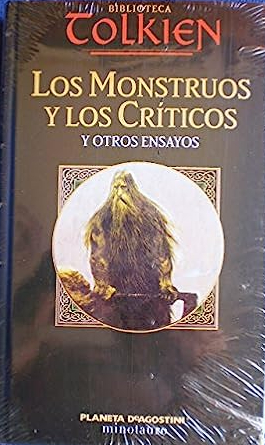What do you think?
Rate this book


284 pages, Hardcover
First published January 1, 1983
χρόνος ανάγνωσης κριτικής: 58 δευτερόλεπτα
Δεν μου αρέσει να επαναλαμβάνομαι για αυτό θα το πω όσο πιο σύντομα
γίνεται.
Ο Τόλκιν επειδή δεν έκδωσε πολλά βιβλία όσο ήταν εν ζωή (9 στο σύνολο σε
αντίθεση με τα 30 και βάλε που κυκλοφορούν σήμερα) και επειδή ο γιος του
ανέλαβε την επιμέλεια του έργου του πατέρα όπως επίσης και πολλοί
άλλοι επιμελητές, πολλά γραπτά του επαναλαμβάνονται είτε σε διάφορες
μορφές, είτε επαυξημένα, είτε και αυτούσια. Και αυτός είναι ο κύριος λόγος
που κάποιες φορές παθαίνω κορεσμό από Τόλκιν.
Εδώ μέσα περιέχονται 7 δοκίμια / ομιλίες:
1)Beowulf: The Monsters and the Critics
2)On Translating Beowulf
Αυτά τα διάβασα πρώτη φορά εδώ αλλά το θέμα του δεν μου είναι εντελώς
καινούριο. Διάβασα και πιο παλιά την μετάφραση του Τόλκιν για αυτό το
αρχαίο αγγλικό έπος
Beowulf: A Translation and Commentary
3) Sir Gawain and the Green Knight
Πρώτη φορά εδώ αλλά το διάβασα και δεύτερη τον περασμένο μήνα (Φλεβάρη)
στο Sir Gawain and the Green Knight, Pearl, and Sir Orfeo
4) On Fairy-Stories
Τρίτη φορά που το διαβάζω. Πρώτη εδώ: Tales from the Perilous Realm
και δεύτερη εδώ: Tree and Leaf
5) English and Welsh
Πρώτη φορά εδώ και παρουσιάζει αρκετό ενδιαφέρον από γλωσσολογικής άποψης.
Μιλάει για το τι καθιστά μια μητρική γλώσσα, εθνικότητα, φυλή, και τις
μεταξύ τους σχέσεις, όπως επίσης και για την έμφυτη προτίμηση σε μια γλώσσα.
6)A Secret Vice
Δεύτερη ανάγνωση. Η πρώτη ήταν στο A Secret Vice: Tolkien on Invented Languages
7) Valedictory Address to the University of Oxford
Πρώτη φορά εδώ και όπως λέει και ο τίτλος είναι ο αποχαιρετιστήριος λόγος του
Τόλκιν πριν συνταξιοδοτηθεί το 1959.